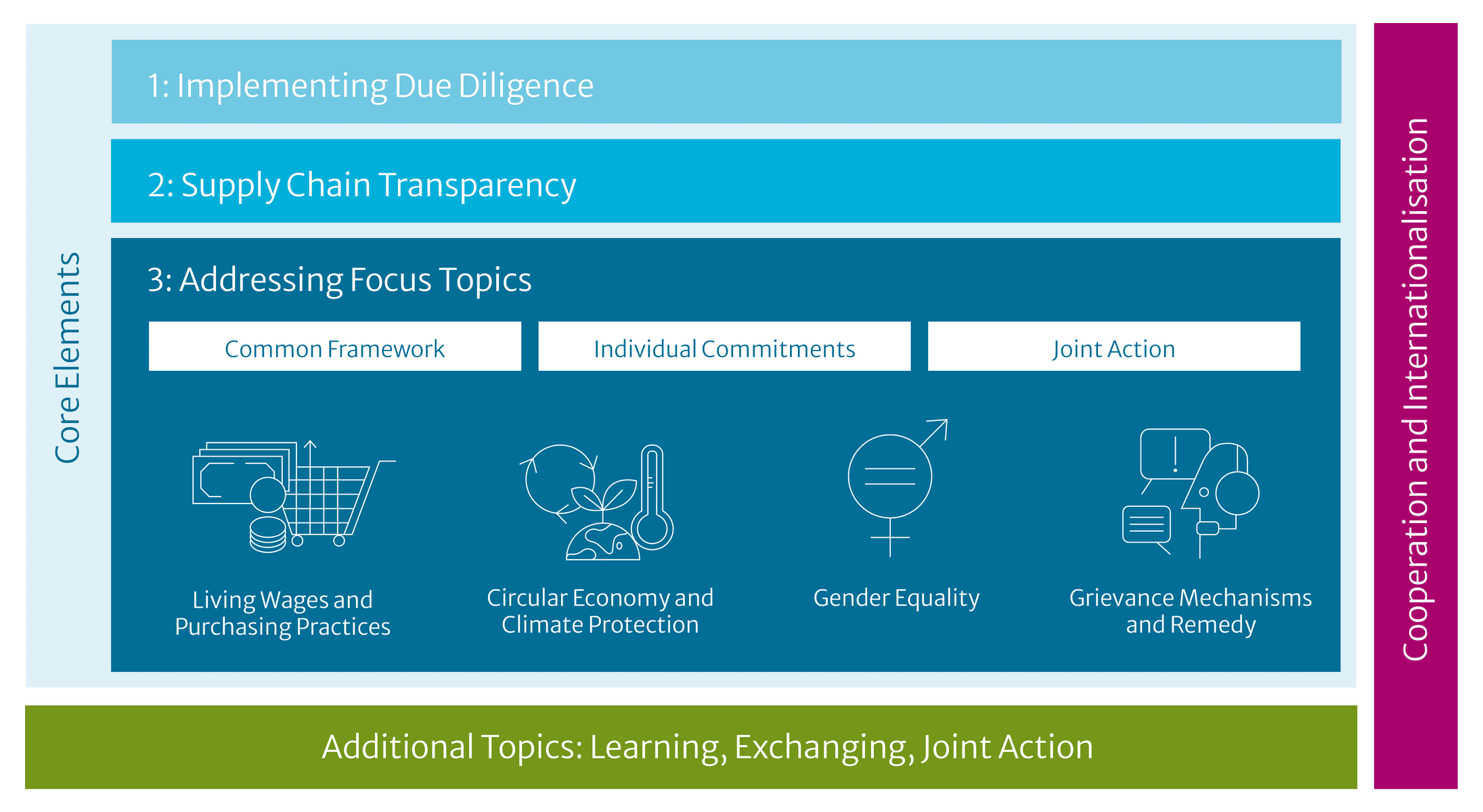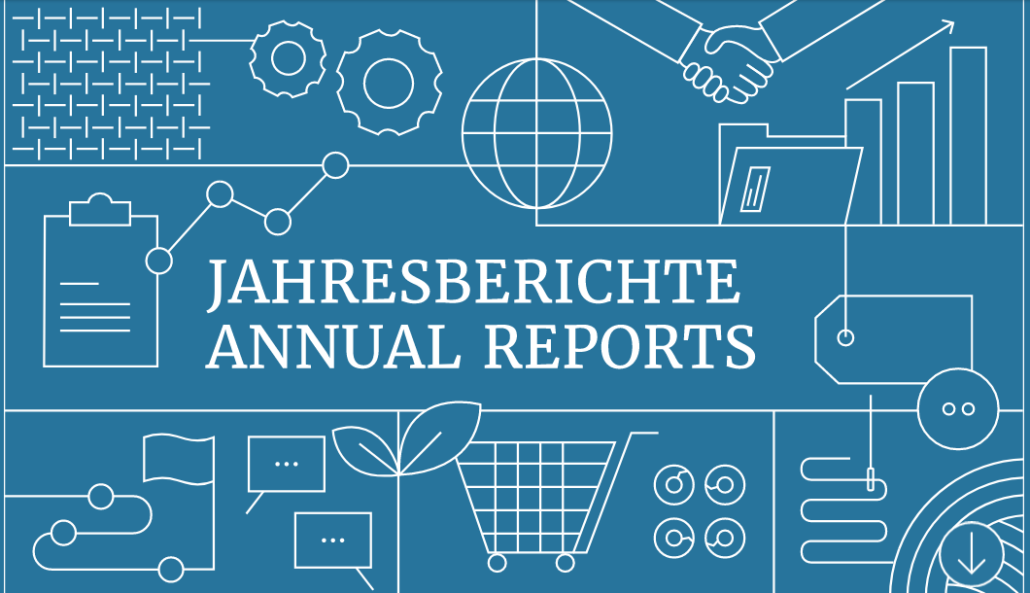Partnership Profile
The Partnership for Sustainable Textiles advocates for a social, environmental, and corruption-free textile and garment industry - one that respects the rights of all workers, protects the climate and the environment, and operates with integrity and within planetary boundaries.
As a multi-stakeholder initiative, the Textiles Partnership brings together companies, associations, non-governmental organisations, standard setting organisations, trade unions and the German Federal Government. In addition, the PST cooperates with European and international initiatives in order to disseminate best practices and increase the leverage of its joint action.
The Textiles Partnership aligns its work with international agreements and guidelines that define the principles of social, ecological and economic sustainability. It emphasises the implementation of corporate due diligence in Germany, Europe and worldwide.
The Partnership objectives concerning social and human rights issues are based in particular on the ILO Conventions, the UN Principles on Business and Human Rights, and the OECDGuidelines for Multinational Enterprises. The environmental and climate objectives as well as those for sustainable natural fibre production are also based on international standards . In implementing its goals, the Partnership is strongly oriented towards the recommendations of the OECD on the implementation of corporate due diligence in the garment and footwear sector:
Partnership members are on the path to substantial improvements along global textile supply chains, with core elements being Implementing due diligence,Supply chain transparency and the effective work on four PST focus topics. In order to achieve greater impact and harness synergies, the Textiles Partnership cooperates with the relevant organisations and initiatives in the sector.
It is becoming increasingly important for companies to implement human rights, social and environmental due diligence. For many years, the Textiles Partnership has been consistently aligning itself with the due diligence approach as defined and recommended by the UN, ILO and OECD. The German Supply Chain Due Diligence Act (LkSG) and initiatives at European level such as the EU Textile Strategy, the Circular Economy Action Plan, eco-design guidelines and the Corporate Sustainability Reporting Directive (CSRD) are also based on these guidelines and recommendations.
In the Textiles Partnership, member companies must regularly demonstrate publicly how they implement due diligence in their supply chains. This also includes that companies systematically analyse and prioritise the risks in their supply chains. Based on this, they set targets and derive measures to counter these risks and initiate improvements. In order to do so, companies can use the Textiles Partnership's established Review Process However, the Textiles Partnership also recognizes the report to the Federal Office of Export Control (BAFA) in connection with the LkSG and the report for the Green Button 2.0 as evidence.
Knowing one's own supply chain is crucial for identifying grievances, mitigating risks and initiating improvements. However, textile production is complex and involves many process stages, starting with the production of raw materials, through yarn and fabric production, finishing the fabrics, and ending with garment manufacturing, where seamstresses finish the garments. Creating transparency all the way to the beginning of the supply chain is (still) a challenge for many companies. The Partnership members are taking on this challenge and the Partnership Secretariat is supporting them.
Since 2020, the Partnershsip for Sustainable Textiles has published an aggregated list of production sites and supplier data on the platform Open Supply Hub. The publicly accessible, collaborative supply chain data collection platform can be used and populated by stakeholders from various industries. Until now, the publication of supply chain data has been voluntary; from 2023, all Partnership companies must feed their supplier data into the aggregated list. In this way, the Textiles Partnership contributes to publicly accessible, reliable supply chain information and thus promotes transparency in the industry.




In these four focus topics, the Textiles Partnership identifies key challenges facing the textile and garment sector and at the same time sees a great deal of leverage and potential for improvement.
For all four focus topics there is a Reference frameworkwhich is based on international guidelines and recommendations and presents the goals sought by the Partnership. In addition "Individual Commitments" of the member companies: Using standardised indicators, each member can measure progress in the focus topics individually and the Partnership can measure progress in aggregate. The progress is collected and published annually.
In addition, for all focus topics there will be Joint Action implemented jointly by the members in the production countries. These projects should also make a measurable contribution to the focus topics and contribute to the individual indicators and targets.
What is the Textiles Partnership?
The Partnership for Sustainable Textiles is a multi-stakeholder initiative with members from the private sector (companies and associations), trade unions, non-governmental organisations, standard organisations and the German Federal Government. Together, they are committed to a social, ecological and corruption-free textile and clothing industry. In order to achieve its goals, the Textiles Partnership places particular emphasis on the implementation of corporate due diligence obligations in Germany, Europe and worldwide. Here you will find further information on the Textiles Partnership.
Who can become a member of the PST?
In light of the complex global challenges facing the textile and garment industry, real change requires the participation of all stakeholders. As a multi-stakeholder initiative, the Textiles Partnership therefore brings together companies in the textile and garment industry and trade with other actors who are active on the subject of sustainable textiles – including associations, non-governmental organisations, trade unions and standard organisations. The German Federal Government is represented by three Federal Ministries. In addition, scientific institutions or federal authorities can become advisory members. Further information on the membership
Which topics does the Textiles Partnership deal with?
Schwerpunktmäßig bearbeitet das Textilbündnis vier Fokusthemen: 1) Living wages and purchasing practices, 2) Kreislaufwirtschaft und Klimaschutz, 3) Gender equality und 4) Grievance mechanisms and remedy.
There is a frame of reference for each focus topic. It provides orientation in terms of content and presents the desired benchmarks and implementation steps. In addition, there are "individual commitments" of the member companies: Using standardised indicators, each member can measure progress in the focus topics individually and the Partnership can measure progress in aggregate. Lastly, the members jointly implement projects that make a measurable contribution to achieving the goals formulated in the reference framework of the respective focus topics.
Are there membership fees?
No membership fees are charged for a membership in the Partnership for Sustainable Textiles. Costs may arise for assessment meetings as part of the Review Process as well as for participation in Partnership initiatives and projects in production countries.
What distinguishes the Textiles Partnership from the "Green Button" label?
The Textiles Partnership and the Green Button are based on the same fundamental international agreements of the UN on compliance with human and workers' rights, environmental protection and the prevention of corruption, as well as on corresponding EU guidelines and initiatives and on the recommendations of the OECD. Both strive for the consistent implementation of human rights and ecological due diligence obligations. While the Textiles Partnership pursues this goal as a multi-stakeholder initiative with learning, dialogue and reporting formats, information, joint measures in production countries and a broad international cooperation network, the Green Button is a state meta-label for which companies must fulfil certain procuct and company criteria product and company criteria. Through active membership in the Partnership, companies can prepare for possible certification with the Green Button. In addition, the Green Button 2.o audit report will be recognised in the PST Review Process from 2023 onwards. Further information on the Green Button website and on other (textile) certifications and labels on Siegelklarheit.
What is the added value of a membership in the Textiles Partnership?
As the first point of contact for all companies that want to assume their ecological and human rights responsibility throughout the entire supply chain, the Textiles Partnership offers a broad network and support. Among other things, it is a platform for learning and dialogue: the members network within and with the other stakeholder groups. They share their knowledge and work together on best practices, for example in webinars and workshops, expert and working groups as well as with the help of tools and support materials. In addition, the members join forces in Partnership initiatives and projects and, thus achieve improvements and progress in the producing countries that would hardly be possible on their own.
How does the Textiles Partnership support the implementation of the Supply Chain Care Obligations Act?
In 2021, the German Federal Government passed the Supply Chain Care Obligations Act (LkSG). The law lays down requirements for the due diligence obligations of companies. The Textiles Partnership is also committed to the implementation of due diligence obligations and is guided by international standards. With the Review Process, the Textiles Partnership has developed an implementation framework and a reporting format for corporate due diligence. Companies in the Textiles Partnership, for example, are therefore familiar with the systematic analysis of their risks and are therefore well prepared for the requirements of the law. However, a membership in the Textiles Partnership and participation in the Review Process are not proof of compliance with the legal requirements. On the homepage of the German Federal Ministry for Economic Cooperation and Development you will find further information on the Supply Chain Act.
Read the full Online-Jahresberichte des Bündnisses für nachhaltige Textilien.




